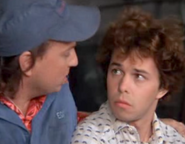Ray Bradbury’s science fiction novels were popular in my junior high, and I read all of them, even those with language somewhat too complex and florid: The Martian Chronicles, Dandelion Wine, The Golden Apples of the Sun. My parents disapproved, thinking that any book with “Martian” or “Sun” in the title must be atheist science fiction, but actually Bradbury wrote nostalgia, evoking a Mars or future Earth identical to his own childhood in Indiana, with church steeples, moving-picture shows, ice cream socials, rummage sales, and lots of heterosexual nuclear families. he men were all strong and decent and slow-talking, the women all stoic and once-beautiful, the boys all rambunctious, the girls all timid. But there was always a sadness in his heterosexual Arcadia, as the men lay next to their wives at 3:00 am, staring out at their own mortality and desperately wishing that they were boys again, because through marrying and making families and getting their stern decent jobs, they had lost something precious and vital, a primal connection with the world and with each other. What did they lose? And how?
 Something Wicked This Way Comes (1962) is an unrecognized gay novel. Bradbury tells us of Will Halloway and Jim Nightshade (played by Shawn Carson and Vidal Peterson in the 1983 movie), thirteen-year old boys growing up – or, rather, being, for their lives are eternal and immutable – in a bucolic 1920’s Midwest.
Something Wicked This Way Comes (1962) is an unrecognized gay novel. Bradbury tells us of Will Halloway and Jim Nightshade (played by Shawn Carson and Vidal Peterson in the 1983 movie), thirteen-year old boys growing up – or, rather, being, for their lives are eternal and immutable – in a bucolic 1920’s Midwest.They are quite obviously in love, with an instinctive, inevitable bond, as integral to their world as the rhythms of school and home and swimming-holes and rock-strewn lanes, accepted without question by children and adults alike. But the week before Halloween, just days before they turn fourteen, the Cooger & Dark Pandemonian Shadow Show rolls by night into Green Town, Illinois, and their lives change forever.
They peer through a window and see people who “let fall clothes to the rug, stood raw and animal-crazy, naked, like shivering horses, hands out to touch each other”
They peer into a movie theater and see “a woman’s face. . .shadowed by the motion of her lips. . .the snow-pale death-shimmering illumination from her cheeks”
That is, they move from innocence to experience: they acquire knowledge which means sexual knowledge which means heterosexual knowledge, which got Adam booted out of Paradise and causes once-brave men to tremble in their beds at 3:00 am. Here heterosexual desire is purveyed by the sinister carnival owner Mr. Dark. Jim Nightshade is the oldest, so Mr. Dark eats his soul first, transforming him into a cold, dead thing with eyes that can’t see anymore and ears that can’t hear anymore.
You’d think that Will Halloway would be powerless to do anything against the elemental power of Mr. Dark, anything except hold his beloved tightly in his arms and cry. But he’s not about to give up without a fight. He and his Dad force back life into Jim’s soul like you would breath life into a drowned body: they sing “Swanee River” badly, off-key, and play leapfrog, and do the silly, inconsequential things that lovers do, cavorting and dancing “as it must have been in the first year of Creation, and Joy not yet thrown from the Garden." And gradually, painfully, Jim returns to them.












